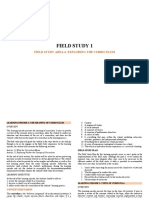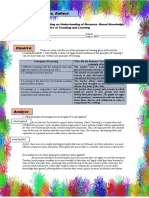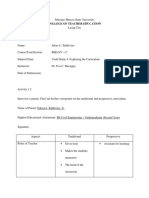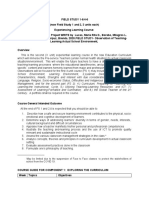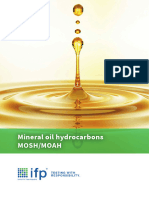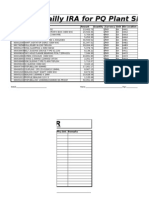Fs 100 Course Outline
Fs 100 Course Outline
Uploaded by
fgjxxiCopyright:
Available Formats
Fs 100 Course Outline
Fs 100 Course Outline
Uploaded by
fgjxxiOriginal Title
Copyright
Available Formats
Share this document
Did you find this document useful?
Is this content inappropriate?
Copyright:
Available Formats
Fs 100 Course Outline
Fs 100 Course Outline
Uploaded by
fgjxxiCopyright:
Available Formats
COURSE INFORMATION
1. COURSE NUMBER : Observation of Teaching and Learning in
Actual School Environment
2. COURSE TITLE : FS 100
3. COURSE DESCRIPTION : This is the first experiential course, which will
immerse a future teacher to actual classroom situation and learning environment
where direct observation of teaching learning episodes that focuses on the
application of education theories learned in content and pedagogy courses will be
made. Observations on learner's behavior, motivation, teacher's strategies of
teaching, classroom management, assessment in learning among others shall be
given emphasis. A portfolio shall be required in the course.
4. PRE-REQUISITE : FS
5. Course Content and Target Learning Outcomes
Topic/Task Target Learning Outcomes
MODULE 1: Learners Behavior 1. Discuss the social learning theory.
2. Identify the social learning theory.
Lesson 1: Learners Social 3. Create classroom social learning theory learning plan aligned to learner's
Behavior teaching-learning process.
Lesson 2: Behavioral Support 4. Identify on how positive and negative support can be properly applied in the
Management teaching-learning process.
5. Discuss about behavior applies in the classroom.
6. Present a behavior management pan and an intervention strategy through
making a matrix presentation.
MODULE 2: Learner’s Motivation 1. Describe learners’ motivation to learn.
2. Distinguish intrinsic from extrinsic motivation.
Lesson 1: Learners’ Motivation and 3. Make a dimensions of learners’ motivation through students’ perspectives
Its Dimensions through writing a lesson plan.
4. Describe teacher’s approaches to motivate learners.
Lesson 2: Teaching Approaches 5. Conduct interview on school program and activities that motivates
and School’s Initiatives to Motivate students.
Students 6. Present the list some school programs for the students to be motivated
through making an intervention plan.
Lesson 3: Parents’ Involvement 1. Describe the role of parents in learner’s motivation.
and Cultural Effects on Learners’ 2. Conduct an interview to the parents on they motivate the child to learn.
Motivation 3. Enumerate some activities parents do to motivate their child to learn
through making a brochure.
MODULE 3: Classroom 1. Identify the cooperating teacher’s style of managing his/her class.
Management Skills in the 2. Acquaint with the classroom routine established by the teacher to
Teaching Learning Process maximize time for teaching – learning activities.
Lesson 1: Classroom Management 3. Identify the classroom routine established by the teacher on how a
Skills and Styles classroom is organized and managed through making a reflection paper.
Lesson 2: Enriching the Teaching 1. Identify the cooperating teacher’s style of managing his/her class.
and Learning Experiences 2. Acquaint with the classroom routine established by the teacher to
maximize time for teaching – learning activities.
3. Identify the classroom routine established by the teacher on how a
classroom is organized and managed through making a reflection paper.
4. Identify the different methods, and strategies used by the cooperating
teachers in the classroom through observation.
5. Identify the teaching strategies, activities, assignment and instructional
materials used by the teacher.
Lesson 3: Communication Skills: 1. Enhance speaking skills through interactive communication with the buddy
Enhancement with Buddy and and their cooperating teacher.
Mentor. 2. Recognize and appreciate the importance and use of clear, coherent and
concise interactive communication with the buddy and mentor.
3.Identify an assessment on communication skills through listing in the self-
assessment tool.
MODULE 4: Observation in 1. Identify the general classifications and types and of assessments used by
Assessment in Learning the classroom teacher in assessing students’ learning in observations of
Lesson 1: Observations on the the actual teaching-learning episodes.
Use of Traditional and Alternative 2. Analyzes the general classifications of assessments used by the teacher
Assessments in terms of how, when, and why they are used in the teaching-learning
episodes observed.
3. Reflect about personal learning experiences in terms of the dialogue
between theory and practice.
4. Identify on how to make the assessment activities through writing an
observation on selected the teaching episode.
Lesson 2: Observations on the 1. Identify the formative assessments used by the classroom teacher in
Use of Formative Assessments and assessing students’ learning in his/her observations of the actual teaching-
Summative Assessments towards learning episodes.
Holistic Assessment 2. Analyze the formative assessments used by the teacher in terms of how
these are used to make assessment holistic.
3. Evaluates the formative assessments used against the learning
competencies through the constructive alignment lens.
4. Identify learning experiences in terms of how the assessment of learning
theories which are previously learned are applied in the actual teaching
and learning episodes observed through a reflection.
5.Make reflections by showing on how to improve based on the observed
practice.
Lesson 3: Observations On 1. Identify the summative assessments used by the classroom teacher in
Summative Assessments assessing students’ learning in observations of the actual teaching-
learning episodes.
2. Analyze the summative assessments used by the teacher in terms of how
these are used to make assessment holistic.
3. Evaluates the summative assessments used against the learning
competencies and standards through the constructive alignment lens.
4. Make a reflection about learning experiences in terms of how the
assessment of learning theories which are previously learned and applied
in the actual teaching and learning episodes observed.
5. Make a reflection showing on how to improve the observed practice.
6.Make a compilation of an e-case portfolio showing all the outputs
submitted.
Exit Conference 1. Compile the sample lesson or learning plans, video of
E-case Portfolio the actual demonstration teaching, instructional
materials, rubrics, and other related evidences.
Acero, Victoria et al. (2000). Principles & Strategies of Teaching. Rex Book Store.
Atienza, Sonia et al. (2000). Student Teaching Handbook. Rex Book Store.
Barry, Kevin ans Len King. (1998). Beginning Teaching and Beyond. Social Sciences Press.
Bullock, Ann Adams and Parmalee P. Hawk. (2001). Developing a Teaching Portfolio. Merill. Prentice Hall.
Ohio.
Colin, Marsh. (2004). Becoming A Teacher. Pearson Prentice Hall. Australia.
Corpuz, Brenda and Gloria G. Salandanan. (2003). Principles and Strategies of Teaching. Lorimar Publishing
Co. Inc.
Corpuz, Brenda et al. (1997). Manual for OBSERVATION, Participation and Community. Immersion. Katha
Publishing co. Inc.
Logus, Modesta Grey (n.d.). Student Teaching Manual. National Book Store.
Pohl, M. (2000). Learning to Think,Thinking to Learn. Hawker Brownlow Education.
Singh, Amarjit. (2004). Classroom Management: A Reflective Perspective. Kanishka. Publishers Distributors,
India.
Smith, Susan G. et al. (2003). teaching Challenges and Dilemmas. Nelson Smith. Australia Pty. Limited.
MANUALS/COURSE PACK
A Self-Assessment Guide for the Child Friendly School. Department of Education. UNICEF.
Joint DepEd-CHED Guidelines on Deployment of Student teachers. 2004.
Mentoring the Student Teacher. (2002). DepEd. Region X.
Professional Application and Reflections 2 (PAR2). UNISA.
Merlas, V., Abina, I., Casumpa, A., Sucuano,F.,.(2021). Project WRITE XI: Course Pack on Field Study 1:
Observation of Teaching-Learning in Actual School Environment. CHED-XI
ELECTRONIC:
Cora Riley. IDE 621 Principles of Instruction and Learning. Behaviorism Observation Checklist. Retrieved on July 20,
2020 from https://sites.google.com/site/ide621knowledgebaseriley/behaviorism/behaviorism-observation-checklist
Lou Juan chon, PhD Theories of Learning. Retrieved on July 20, 2020 from
https://ayeshapenuela.files.wordpress.com/2013/07/module-7-social-learning-theories.pdf
Open Stax College. Operant Conditioning. http://cnx.org/contents/Sr8Ev5Og
@5.52:r470BCFb@7/Operantconditioning. License: http://cnx.org/contents/4abf04bf-93a0-45c3-9cbc-
2cefd46e68cc@5.48 Retrieved on July 26, 2020 from https://courses.lumenlearning.com/waymaker-
psychology/chapter/reading-operant-conditioning/
Jessica Traylor for Lumen Learning. Classical conditioning Interactive. Lumen Learning. License: CC BY: Attribution
Retrieved on July 26, 2020 from https://courses.lumenlearning.com/waymaker-psychology/ chapter/classical-
conditioning/
Jessica Traylor for Lumen Learning. Operant conditioning interactive. Lumen Learning. License: CC BY: Attribution.
Retrieved on July 26, 2020 from https://courses.lumenlearning.com/waymaker-psychology/chapter/operant-
conditioning/
Sarah Mae Sincero (May 10, 2011). Operant Conditioning. Retrieved Jul 25, 2020 from
Explorable.com: https://explorable.com/operant-conditioning
Kober, Nancy and Usher, Alexandra. (2012). Student Motivation: An Overlooked Piece of School Reform.
https://files.eric.ed.gov/fulltext/ED532666.pdf
Legault, Lisa. (2017). Self-Determination Theory. 10.1007/978-3-319-28099-8_1162-1.
McLeod, S. A. (2018, January, 21). Skinner - operant conditioning. Simply
Psychology.https://www.simplypsychology.org/operant-conditioning.html
Weiner, Bernard. (2010). Attribution Theory. 10.1002/9780470479216.corpsy0098.
Dodge, J. (n.d.). What are formative assessments and why we should use them? Accessed from
https://www.scholastic.com/teachers/articles/teaching-content/what-are-formative-assessments-and-why-should-we-
use-them/ on July 29, 2020.
Formative and summative assessments. Accessed from https://poorvucenter.yale.edu/Formative-Summative-
Assessments on July 28, 2020.
Habla, R. (n.d.). Traditional and alternative assessments. Accessed from
https://upousite.wordpress.com/2016/02/24/traditional-alternative-assessments-3/ on July 31, 2020.
Prepared by:
ROQUE N. LANGCOY II, Ed.D.
DORSU San Isidro
You might also like
- Queena Jessa D. Moratal Learning Episode 9 PDFDocument10 pagesQueena Jessa D. Moratal Learning Episode 9 PDFNelle christine Tanguilan78% (49)
- Ginger As Purifier 1Document23 pagesGinger As Purifier 1Micah Louise Aliviado100% (2)
- FS 1 Chapter 4 Lo 123 5Document19 pagesFS 1 Chapter 4 Lo 123 5Janine Binbing100% (11)
- Types of LessonsDocument29 pagesTypes of LessonsJerico Ventura100% (8)
- One-Act Play (Script)Document29 pagesOne-Act Play (Script)fgjxxiNo ratings yet
- Project WRITE XI:: Course Pack On Field Study 1: Observation of Teaching-Learning in Actual School EnvironmentDocument42 pagesProject WRITE XI:: Course Pack On Field Study 1: Observation of Teaching-Learning in Actual School EnvironmentLorelyn Corage100% (6)
- Episode 1to5Document69 pagesEpisode 1to5Dex Ramirez100% (5)
- fs4 (Episode 6) PDFDocument7 pagesfs4 (Episode 6) PDFCes Reyes100% (8)
- Varahi Krama EnglishDocument20 pagesVarahi Krama Englishmahesh madhavan100% (2)
- Learning Plan - FS 1Document2 pagesLearning Plan - FS 1MARISOL SALESNo ratings yet
- Elc 101 Worksheet 4Document6 pagesElc 101 Worksheet 4Arlyn SANTOSNo ratings yet
- Episode 9: Preparing For Teaching and LearningDocument9 pagesEpisode 9: Preparing For Teaching and LearningJaja ColeenNo ratings yet
- Field Study 1 Learning EpisodeDocument90 pagesField Study 1 Learning EpisodeRoxanne DelezNo ratings yet
- 9 FS 1 PrintedDocument9 pages9 FS 1 PrintedMarisol NaranjoNo ratings yet
- Field Study 1 All TopicsDocument29 pagesField Study 1 All TopicsKyle CabunilasNo ratings yet
- Observe, Analyze, Reflect Activity 9.1Document52 pagesObserve, Analyze, Reflect Activity 9.1Jhoan TupasNo ratings yet
- Pamt311 Midterm ReviewerDocument8 pagesPamt311 Midterm RevieweralcabalecristinejoyNo ratings yet
- FS1 Activity 1 Group3Document8 pagesFS1 Activity 1 Group3Honey Fujisawa60% (5)
- Module 5Document27 pagesModule 5Jollibee BatanteNo ratings yet
- Pamt Notes MidtermDocument12 pagesPamt Notes MidtermNicole EusebioNo ratings yet
- Prof - Ed 109 Chapter1 (Millano, Jocelyn, O. Bse II Science)Document4 pagesProf - Ed 109 Chapter1 (Millano, Jocelyn, O. Bse II Science)Celyn MillanoNo ratings yet
- FS 2Document103 pagesFS 2Angelie BrionesNo ratings yet
- Group 2 ReportersDocument1 pageGroup 2 ReportersMagongcar hadjialiNo ratings yet
- fs1 Ep 9 UpdatedDocument10 pagesfs1 Ep 9 UpdatedMillet CastilloNo ratings yet
- Teacher Induction Program Module 5 V1.0Document22 pagesTeacher Induction Program Module 5 V1.0Joyce Anne Petras100% (1)
- FS 1 Episode 9Document9 pagesFS 1 Episode 9rheamirando2002No ratings yet
- B FS1 Activity 1 UpdatedDocument10 pagesB FS1 Activity 1 Updatedgeronimo.arnel001No ratings yet
- Field Study 1 Module 4Document23 pagesField Study 1 Module 4Gene Guilaran AsoyNo ratings yet
- Module 3. Lesson 2Document5 pagesModule 3. Lesson 2Janin R. CosidoNo ratings yet
- Teacher Induction Program: Department of EducationDocument24 pagesTeacher Induction Program: Department of Educationjessica laran100% (1)
- FIELD STUDY 4 (Interview)Document8 pagesFIELD STUDY 4 (Interview)Julius BaldivinoNo ratings yet
- Final Tasks - Modules 3 and 4Document15 pagesFinal Tasks - Modules 3 and 4Heljane GueroNo ratings yet
- Field Study 1 JaneDocument8 pagesField Study 1 JaneJane Marriane Leocadio CantorNo ratings yet
- FS2 Course PackDocument99 pagesFS2 Course PackNoland Denver C. GegremosaNo ratings yet
- Chapter 4Document27 pagesChapter 4mia rolane jagonia100% (1)
- Educ 11 Field Study 1 Course PackDocument17 pagesEduc 11 Field Study 1 Course PackallitnamjonnasjonnasNo ratings yet
- Teacher Induction Program: Department of EducationDocument26 pagesTeacher Induction Program: Department of EducationDanny LineNo ratings yet
- FS1 - Activity 1-CARPIZO HAYDEE S.Document8 pagesFS1 - Activity 1-CARPIZO HAYDEE S.Haydee CarpizoNo ratings yet
- LE 9 11 601Document18 pagesLE 9 11 601Nadjerah CamarodinNo ratings yet
- CRAFTING THE CURRICULUM - Group4presentationDocument53 pagesCRAFTING THE CURRICULUM - Group4presentationSamaika Pachejo CanalinNo ratings yet
- Teacher Induction Program - Module 5 V1.0Document26 pagesTeacher Induction Program - Module 5 V1.0Paul Romano Benavides RoyoNo ratings yet
- FS1 Worksheet 9Document3 pagesFS1 Worksheet 9Sheila Dinglasan100% (4)
- Field Study 2Document44 pagesField Study 2Jetaime SioconNo ratings yet
- Learning Episode 2Document9 pagesLearning Episode 2Erna Vie ChavezNo ratings yet
- Le #2 PDFDocument5 pagesLe #2 PDFJovannie Bugsahan NacalabanNo ratings yet
- Field Study 1 Learning Episode 9Document15 pagesField Study 1 Learning Episode 9Joshua Lander Soquita Cadayona100% (1)
- FS1. Ep9 Ep16Document52 pagesFS1. Ep9 Ep16Marites Deliarte DipadNo ratings yet
- ED105 ReviewerDocument10 pagesED105 Revieweraizabhelle2003No ratings yet
- Activty 1 Group SummaryDocument13 pagesActivty 1 Group SummaryName S. CruzNo ratings yet
- Activity 1 FS 1Document8 pagesActivity 1 FS 121bgu0195msNo ratings yet
- 7factura, Neil R-La Paz National High SchoolDocument5 pages7factura, Neil R-La Paz National High SchoolFactura NeilNo ratings yet
- DLL TemplateDocument4 pagesDLL TemplateMarilyn LaquindanumNo ratings yet
- Instructional Approaches and Underlying TheoriesDocument72 pagesInstructional Approaches and Underlying TheoriesYvonne Samuels-RamsayNo ratings yet
- Le #1 PDFDocument2 pagesLe #1 PDFJovannie Bugsahan NacalabanNo ratings yet
- FS1 - Learning Episode 9Document7 pagesFS1 - Learning Episode 9DANIELA GALINGANNo ratings yet
- Apendix ProposalDocument8 pagesApendix Proposalgeap559No ratings yet
- SQ GoalsDocument3 pagesSQ Goalsapi-458364085No ratings yet
- Experiencing The Teaching and Learning Process Episode 1 Learning Through The Meaningful Learning ProcessDocument16 pagesExperiencing The Teaching and Learning Process Episode 1 Learning Through The Meaningful Learning ProcessSa MeerahNo ratings yet
- Task, Quantum Lesson Study, and DiscussionDocument10 pagesTask, Quantum Lesson Study, and DiscussionIhsan AbdieNo ratings yet
- FS-101 Course OutlineDocument4 pagesFS-101 Course Outlinefgjxxi0% (1)
- Junio Bryan F. FS2 Activity 3 G4Document7 pagesJunio Bryan F. FS2 Activity 3 G4Bryan JunioNo ratings yet
- Done Eps 999Document5 pagesDone Eps 999Mharilyn E BatalliaNo ratings yet
- The Structured Method of Pedagogy: Effective Teaching in the Era of the New Mission for Public Education in the United StatesFrom EverandThe Structured Method of Pedagogy: Effective Teaching in the Era of the New Mission for Public Education in the United StatesNo ratings yet
- Research in Education QuestionsDocument21 pagesResearch in Education QuestionsfgjxxiNo ratings yet
- Kristel Rose S. Pasaol BEED 3-EED 112: Rubrics For Physical Education (Fitness Exercise)Document5 pagesKristel Rose S. Pasaol BEED 3-EED 112: Rubrics For Physical Education (Fitness Exercise)fgjxxiNo ratings yet
- FS-101 Course OutlineDocument4 pagesFS-101 Course Outlinefgjxxi0% (1)
- What It Realy Means: Activity 1Document4 pagesWhat It Realy Means: Activity 1fgjxxiNo ratings yet
- Name: Kristel Rose S. Pasaol Beed 4: ACTIVITY - Let's Read These Observation Guide For The Learner's Social BehaviorDocument7 pagesName: Kristel Rose S. Pasaol Beed 4: ACTIVITY - Let's Read These Observation Guide For The Learner's Social BehaviorfgjxxiNo ratings yet
- ProSync NF IJAnS Jan 2021Document5 pagesProSync NF IJAnS Jan 2021vetlakshmiNo ratings yet
- Covid-19 Reopen Plan 2020-2021Document42 pagesCovid-19 Reopen Plan 2020-2021News 8 WROCNo ratings yet
- Ethics of Nursing Shift ReportDocument5 pagesEthics of Nursing Shift ReportkelllyNo ratings yet
- Memo Circular 2006-0025 Revised Guidelines On Intenational Travels Foreign FellowshipsDocument25 pagesMemo Circular 2006-0025 Revised Guidelines On Intenational Travels Foreign FellowshipsNursing Staff Development Dr. PJGMRMCNo ratings yet
- Pravesh Niti 2023-24Document39 pagesPravesh Niti 2023-24thelaksh890No ratings yet
- Perform Integrated Change Control (Step-By-Step)Document4 pagesPerform Integrated Change Control (Step-By-Step)Justin M. Fowlkes100% (1)
- Enviromental Wellness (Draft)Document14 pagesEnviromental Wellness (Draft)KieyNo ratings yet
- s12355 013 0247 4Document6 pagess12355 013 0247 4fungsional fungsionalNo ratings yet
- Cardiac EmergenciesDocument38 pagesCardiac Emergenciesnurasia oktianiNo ratings yet
- MOSH MOAH Brochure EN-1Document24 pagesMOSH MOAH Brochure EN-1mei yeeNo ratings yet
- COA of Hydrolysis AA80% Plant Origin From KatyDocument2 pagesCOA of Hydrolysis AA80% Plant Origin From Katyfertilizer exporterNo ratings yet
- © Ncert Not To Be Republished: Food: Where Does It Come From?Document5 pages© Ncert Not To Be Republished: Food: Where Does It Come From?kritagyasharma29No ratings yet
- A1 Reading and VocabDocument60 pagesA1 Reading and VocabVũ Quốc ĐạiNo ratings yet
- FM Global Report SprinklersDocument109 pagesFM Global Report SprinklersManuel Otero AlzaNo ratings yet
- Panchatantra Tales - Wisdom Stories (Illus - Compiled by Maple Press (Maple Press) (Z-Library)Document62 pagesPanchatantra Tales - Wisdom Stories (Illus - Compiled by Maple Press (Maple Press) (Z-Library)dustu boyNo ratings yet
- Annexure - IDocument6 pagesAnnexure - IvgvpplNo ratings yet
- Callictor Ayahuasca Icaros Mantay Kunai Toluca Conference 2014 PDFDocument17 pagesCallictor Ayahuasca Icaros Mantay Kunai Toluca Conference 2014 PDFradamir100% (2)
- When Is A Notice of Donation Needed?: NEDA - National Economic Development AuthorityDocument4 pagesWhen Is A Notice of Donation Needed?: NEDA - National Economic Development AuthorityJonabelle BiliganNo ratings yet
- Screenshot 2024-03-12 at 11.50.15 PMDocument1 pageScreenshot 2024-03-12 at 11.50.15 PMDarshan BavaliyaNo ratings yet
- ss4 Instructions PDFDocument7 pagesss4 Instructions PDFIanDubhNo ratings yet
- People of The Philippines vs. Arnel Kalipayan, GR 229829, January 22, 2018Document1 pagePeople of The Philippines vs. Arnel Kalipayan, GR 229829, January 22, 2018Lu CasNo ratings yet
- Prem Satin EnamelDocument1 pagePrem Satin EnamelShashank AgarwalNo ratings yet
- Daily IRA Sheet Dte & Bin WiseDocument32 pagesDaily IRA Sheet Dte & Bin WiseSumera AliNo ratings yet
- Impact of Climate Change On BirdsDocument7 pagesImpact of Climate Change On BirdsMădălina DimaNo ratings yet
- Hit The BrakesDocument9 pagesHit The Brakesakivara100% (1)
- IC5 L1 OQ Question BankDocument4 pagesIC5 L1 OQ Question BankÉrika CristinaNo ratings yet
- The Profession of Speech TherapistDocument7 pagesThe Profession of Speech Therapistapi-247563586No ratings yet
- History of Modern FoodDocument8 pagesHistory of Modern FoodGrietchen Aguilos Betita-YahonNo ratings yet














